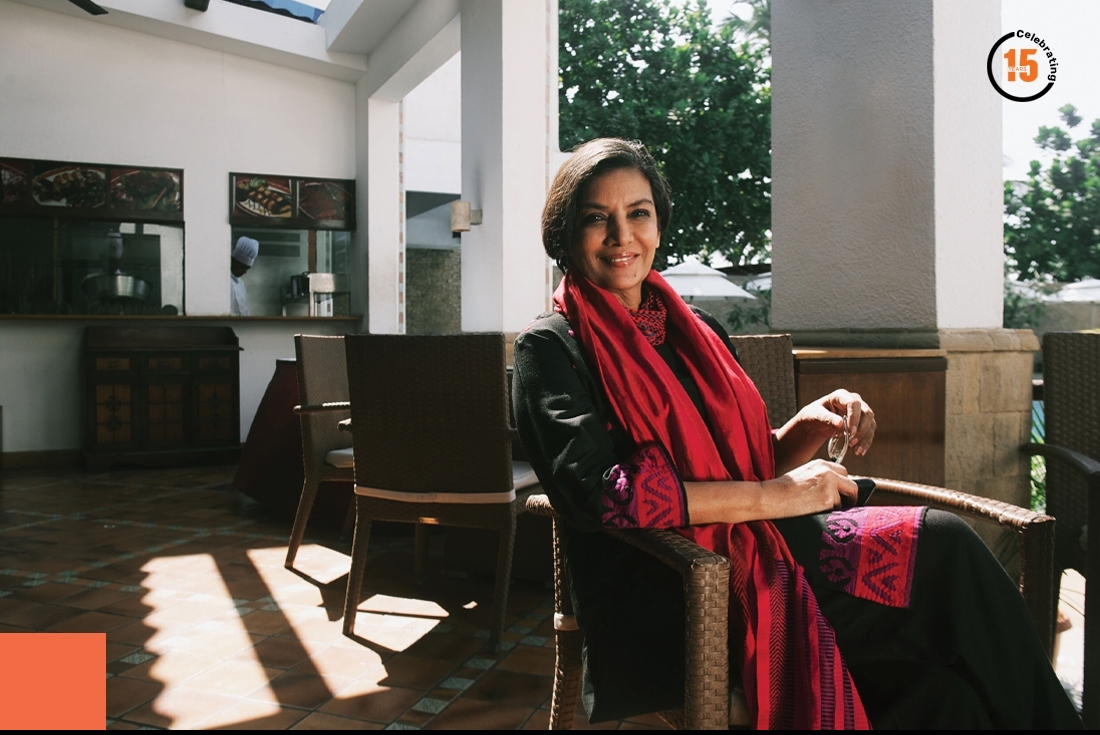
Photography: Evern Dsouza

Photography: Evern Dsouza
Shabana Azmi’s filmography is a compelling reflection of her beliefs and her social standpoint. While her first film, Shyam Benegal’s Ankur, won her the National Award, Mahesh Bhatt’s Arth reformed her perception of her role as an actor and the responsibility bestowed upon an artist as an instrument of social change. An actor par excellence, a social activist who continues to defy her critics and a woman of many attributes - Shabana Azmi, a five-time National Award Winner and Padma Shri recipient, epitomizes an almost enviable trajectory in Hindi cinema. In a candid conversation, she reveals her feelings towards the emancipation of women. Excerpts follow:
Apart from films, your work as a social activist is not only inspiring but has given direction and hope to many people, women in particular. What do you think is the way forward for Indian society?
It’s no secret that India is a patriarchal society where girls lack equal access to education, health, employment and control over their own decision-making ability. I think it’s time for each segment of society to look within themselves, instead of portioning blame on others-the police, the law makers, the justice or films -and see what is it that we can do to change this mindset. Having said that, I believe that art has the ability to create a climate of sensitivity in which it is possible for change to occur and so movies, literature, drama and theatre - all have this possibility that should be utilized. There are some people who believe films are only for entertainment, so let’s redefine entertainment. It is much more in the subliminal messaging that we need informed choices.
Do you think the female actor has the capacity to bring about a change in the way women are portrayed in films?
Absolutely. Nobody else but the actor can initiate this change. Because, when you accept a script, you accept that you are happy with the way the girl is portrayed. Beedi jalaiyle jigar se piya, I think, is really robust and celebrates a woman’s sensuality. It shows her in control and is based in our folk tradition and is fun to watch, but if you say, Mein toh tandoori murgi hoon yaar, ghatka le saiyyan alcohol se you are actually inviting the man to come and attack you. So my plea is that vulgar lyrics and vicarious camera angles do not empower a woman, it commodifies her and girls need to be aware of that. In the past, I have done films in which I wasn’t aware of what the ultimate message was and I have been corrected and I stood corrected and after that I made informed choices.
Do you think in order to bring about an informed change, the film industry needs leadership, and do you think it should be a woman?
Yes, but it does not necessarily have to come from a woman, it will be great if it’s a woman. I think many leaders can emerge from within the film industry. The actual soul searching though, I hope will come from the young generation. The younger generation is not bound to mainstream cinema. They are making different kinds of films. For instance Vicky Donor is a perfect example of excellent subliminal messaging. It’s written by Juhi Chaturvedi, a woman, and I think many of those scenes, particularly the relationship between the mother-in-law and the daughter-in-law, beautifully paints a realistic image of a woman.
In your career in films, are there things that you wish you had done differently?
There is one film that comes to my mind that was an eye opener for me. In the early ‘80s, I was working on a film called Thodi si Bewafaii and I was really satisfied with myself. The film was a silver jubilee and I was quite happy having scored a substantial role, until at a women’s conference it was brought to my notice that the ultimate message of the film robbed a woman of any choice. My character is a woman who walks out on a bad marriage but ultimately comes back to her husband with her tail between her legs. The realization of this message was a revelation for me and made me aware of how important it is to make informed choices as an actor.
This article initially appeared in our 2013 Fashion issue and we are revisiting it as a part of our celebrating 15 years of Platform magazine series.
Text Akanksha Gupta